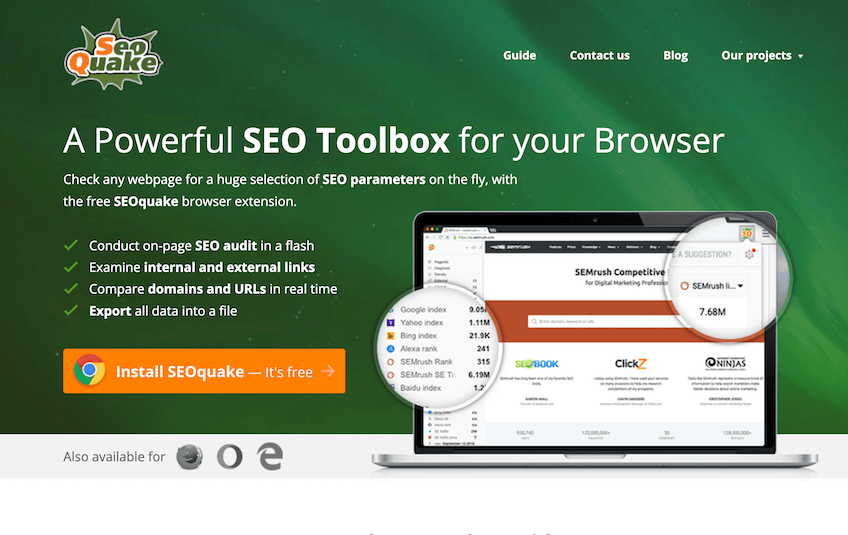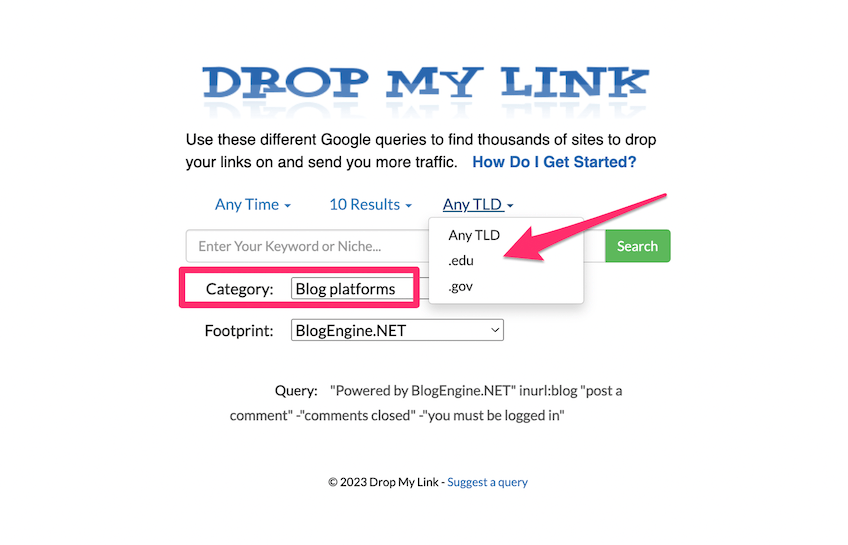To most people, .edu and .gov are just another top level domain. But to SEOs, those three letters mean so much more. While many people in the SEO world doubt the fact that search engines give .edu and .gov site backlinks special superpowers, we can all agree that sites on .edu and .gov domains have the age, trust and domain authority every link builder loves. However, landing these links without resorting to spammy wiki pages or forum profiles is a challenge. This guide will teach you some actionable strategies you can use to add these cream of the crop backlinks to your link profile.
Blog Comments
Believe it or not, most universities and government organizations have jumped head-first into the blogosphere. And that means golden opportunities to get blog comment backlinks. This particular technique is a bit more effective than general blog comment link building because you’re going to be targeting niche-relevant pages.
First, we’ll need to install the SEO Quake Toolbar. This will help us identify the PR of the page that we’ll be dropping links on. Because manual blog commenting can take some time, it’s important to choose our targets wisely.

Once this is installed, you may need to restart your browser to use the toolbox.
Then enter your target keyword on DropMyLink.
Make sure the TLD is set to .edu or .gov, and the category is set to blog platforms.

Now hit search.
Check to see which results have enough page-level PR to make posting a comment worth your while. This one looks promising.
Then scroll down to the bottom to see if there’s still an active comment area.
While it’s tempting to drop an anchor text link by putting your keyword in the “Name” field, this has two downsides: a) it sets you up for a Google penalty and b) it puts a target on your back as a spammer. Instead, use the name of your site or your own name.
Now glance over the article and drop a thoughtful comment.
Remember: even if the blog auto-approves comments, it doesn’t mean they won’t moderate them eventually. If you have a natural anchor text link along with an insightful comment, you’ll probably survive.
Return to Google and repeat the process until you run out of high PR targets.
Create a Scholarship
One of the best ways to get .edu sites to want to link to you is to offer the University’s stakeholders something of value. In our experience, offering an industry-specific or general scholarship is one of the easiest way to grab fistfuls of .edu links.
First, find pages on .edu domains with scholarships. It’s important that you do this before you create your scholarship. This way, you’ll be able to tailor it around pages that have an especially high amount of PR to pass onto your site.
Here are some search strings to help you find scholarship listing pages:
- site:.edu “scholarships”
- site:.edu “college scholarships”
- site:.edu “scholarships links”
- site:.edu “scholarship list”
- site:.edu “list of scholarships”
- site:.edu “Outside Agency Scholarships”
- site:.edu “private Scholarships”
- site:.edu “keyword + scholarships”
Just put one of those into Google and see what you find.
Make sure the the URLs you find have:
- High page rating
- Dofollow links to commercial websites
- Clear contact information
Now create a spreadsheet to keep track of the URLs, PR and contact information that you find:
Although a general scholarship might land you a link from this page, you can increase your odds by making it specific to the University.
Next, create a scholarship listing page with a list of clear requirements. This should include:
- The award amount
- The number of winners
- A .pdf or online application
- Deadline
- Requirements (essay, specific major etc.)
Finally, reach out to the contacts you collected and let them know about your scholarship.
You can repeat this process with .gov sites.
If you do this right you can turn a single $500-$1000 scholarship into dozens of .edu and .gov backlinks.
Blogger Recognition
As you saw earlier, there’s shortage of .edu and .gov blogs. However, getting a non-blog comment link from them is almost impossible. That is, unless you stroke their ego a bit. One of the most powerful ways to get anyone to link to you is to flatter them. And .edu bloggers are no different. By setting up a blogger awards or list of “Best X Bloggers,” you’ll be able to land .edu links with ease.
Here’s how to do it.
First, you need to find a group of related.edu and .gov bloggers that have a blog that’s:
- Active
- Has clear contact information
- Dofollow outbound links
Fortunately, finding blogs like this is a cinch using these search strings:
- site:.edu inurl:blog
- site:.edu “keyword” “blog posts”
- site:.edu “keyword” “post comment”
- site:.edu “keyword” “faculty blogs”
- site:.edu “keyword” “staff blogs”
- site:.edu “keyword” “student blogs”
To make sure your target blogs are still updated, visit each one and see the last post date.
You need sure the latest post is from the last month or two.
Once you’ve found a few that meet the criteria, it’s time to lump them together under a single category. To get the most value from your links, try to choose bloggers in a related niche (Yes, you can do a general “Blogs I Love” or “Best University Bloggers” award. But a specific category makes your shout out seem more legit).
Now you can:
- Start a new WordPress post.
- Find whoever runs the blog or contributes to it the most:
- Add that blogger’s information, including their picture, brief description of their blog and a link to their best post.
Repeat until you have at least 15 winners. Reach out to each letting them know that they’ve won.
Resource Page Link Building
.Edu and .gov resource page-link building is one of our all-time favorite white hat link building strategies. Why? Because resource pages exist for the sole purpose of linking out to other sites! Your job is simply to get whoever runs the resource page, assuming it isn’t spammy, to add a link to your site, which is much easier than asking for a random link.
You can find resource pages using these search strings.
- site:.edu keyword+ inurl:resources
- site:.edu keyword + inurl:links
Let’s assume you have a site in the weight loss niche. You’d want to start off with broad searches like “health” and “nutrition” before getting specific. This will make sure you net a ton of resource page targets.
First, look to make sure they link out to other domains (some .edu resource pages only link out to other pages on their site). Then, see if they link to commercial (non .edu or .gov) sites. A tendency to link to commercial sites significantly increases the odds that they’ll link to you.
Now it’s just a matter of finding whoever manages this section of the site and asking for a link.
Send the moderator a personalized email.
Rinse and repeat! In many ways, this type of link building is a number’s game: the more people you contact the more links you’ll get.
Alumni News
If you’re a graduate of a US-based university you can sometimes get a link to your site in the alumni news section of your alma mater’s site.
Head to Google and search for your school’s alumni news section. (Don’t forget to search for any graduate schools that you’ve graduated from!)
Check to see if the section contains live followed links. Then submit news about what you’re up to (with a focus on your site) to your alumni department.
You can also nab a link by setting up an alumni profile.
First, search to see if your alumni department has this feature on their section of the site.
- site:yourschool.edu “alumni profiles”
- site:yourschool.edu “alum profile”
- site:yourschool.edu “alum record”
Fill in the information (including your site):
Local Resources Pages
If you run a local brick and mortar business, like a restaurant or hotel, you can usually get an easy, powerful link from a University’s admission page. These pages are there to help visiting students and families find local accommodation and amenities.
First, search to see if the University or universities in your area have resource pages with followed links.
- site:school.edu “admissions”
- site:school.edu “accommodation”
- site:.school.edu “local restaurants”
- site:school.edu inurl:visiting
- site:yourschool.com inurl:visiting your school
Look for a local resources page, and see if the section has a category for your industry.
If so, contact the university and suggest that they add your business to the list.
Sometimes schools have pages dedicated to highlighting local businesses for students and faculty.
- site:school.edu “your city + resources”
- site:school.edu “local resources”
- site:school.edu “your city +businesses”
- site:school.edu your city + “things to do”
Now head to the page and see if they post live links to local businesses.
Just contact the person in charge of that page and get your link.
University Discounts
Most universities post a list of businesses that offer discounts and deals for faculty and students on the site. And you don’t have to be a local business to get listed, either. As long as you sell something of value on your site — and can offer a deal to a number of schools — you can get a ton of links.
First, find .edu pages that list discounts with live, followed links.
- site:.edu “staff discounts”
- site:.edu “employee discount program”
- site:.edu “student discounts”
Once you find the right URLs, you need to look for a place to submit your discount. Most, as in this example, have a simple suggestion form.
Some will be really quick. Others may require you to do some paperwork:
Either way, the legwork is worth it for this kind of .edu link action!
There are dozens of state .gov websites that host the same kind of discount pages.
Improve a Section of a Site
This technique requires some hustle, but can pay off big time with a handful of authoritative .edu links. What you do is find sections of an .edu site that’s ugly or out of date. Because most students groups lack the money and know-how to improve their section’s design and functionality, they generally have a subdomain on the site that leaves a lot to be desired. These student groups are usually your best targets. And in exchange for your help they’re generally more than willing to link back to your site.
First, search for student groups that are somewhat niche relevant. This will help make your offer of free help seem more organic.
Or you can simply visit University websites and browse through their student organization websites (most schools have hundreds).
Then find one that looks neglected, and search for contact information (usually on the “officers” page).
You can reach out to lend them a hand with their sites design.
If you don’t know web design you can usually hire someone on freelance sites to do the work on the cheap.
